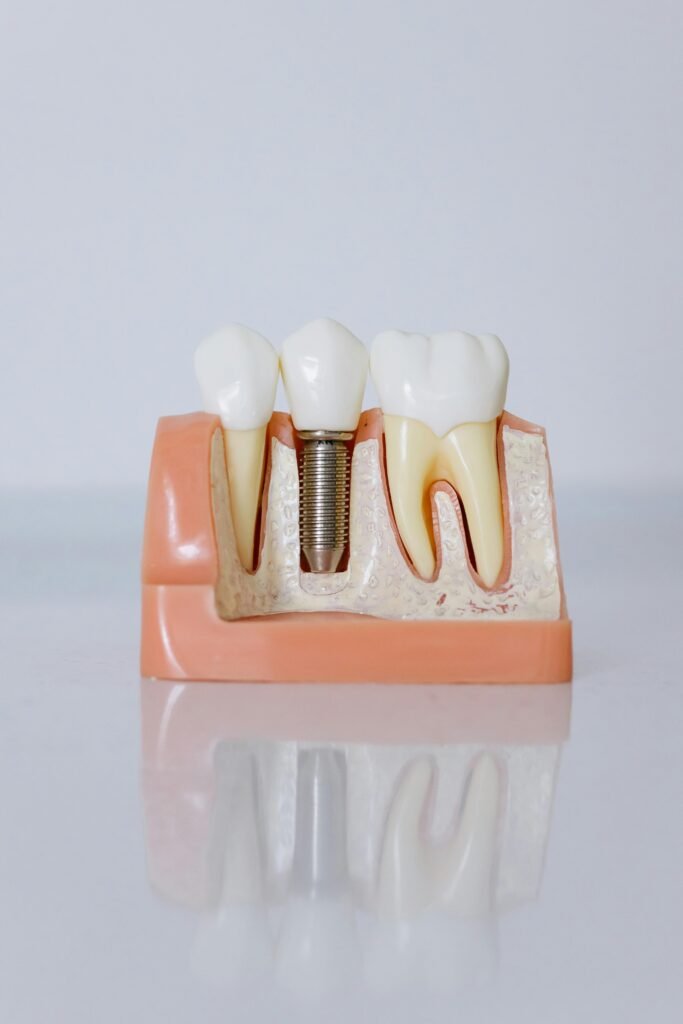Have you ever wondered why some people seem to have perfect teeth while others struggle with a myriad of dental health issues? It turns out that genetics play a significant role in determining the state of our oral health. In this article, we will explore the fascinating world of genetic links to dental health issues and highlight what signs to watch out for. From tooth decay to gum disease, understanding the role genetics play in dental health can help us better care for our teeth and seek appropriate treatment when needed. So, let’s dive into the intriguing world of genetics and oral health!

This image is property of images.pexels.com.
Introduction
Welcome to this comprehensive article on the role of genetics in dental health. In recent years, researchers have made significant progress in understanding how genetics can influence various aspects of oral health, including inherited dental conditions, tooth decay, and periodontal disease. This knowledge opens up new opportunities for personalized treatment approaches and preventive measures. In this article, we will explore the genetic factors influencing dental health, the impact of genetic links on dental treatment, ethical considerations, and the future of genetic research in dentistry.
Genetic Factors Influencing Dental Health
Inherited Dental Conditions
The field of genetics has shed light on several inherited dental conditions that can affect individuals from birth. One such condition is Amelogenesis Imperfecta, which impairs the formation of tooth enamel, resulting in teeth that are discolored, brittle, and prone to wear and tear. Another condition, Dentinogenesis Imperfecta, affects the dentin layer of the teeth, causing them to be translucent, weak, and prone to breakage. Ectodermal Dysplasia, yet another inherited condition, affects the development of teeth, hair, and sweat glands, leading to missing teeth or abnormal tooth structure.
Genetic Predisposition to Tooth Decay
Genetics also plays a role in an individual’s susceptibility to tooth decay. Saliva composition, influenced by genetic factors, can affect the oral environment and the ability to neutralize acid produced by bacteria in the mouth. Additionally, genes involved in enamel mineralization can impact the strength and resistance of tooth enamel to acid erosion. These genetic factors can contribute to an increased risk of dental caries, or tooth decay.
Genetics and Periodontal Disease
Periodontal disease, also known as gum disease, is a common oral health problem that is influenced by genetic factors. Certain genes involved in the inflammatory response and the immune system can affect an individual’s susceptibility to gum disease. Genetic variations in these genes can result in an exaggerated inflammatory response or a weakened immune system, contributing to the development and progression of periodontal disease.

This image is property of images.pexels.com.
Inherited Dental Conditions
Amelogenesis Imperfecta
Amelogenesis Imperfecta is a hereditary condition that affects the enamel formation process, resulting in teeth that are discolored, pitted, and prone to decay. This condition can have a significant impact on an individual’s dental health and aesthetics. While there is no cure for Amelogenesis Imperfecta, there are treatment options available to improve the appearance and functionality of affected teeth, such as dental bonding, veneers, or crowns.
Dentinogenesis Imperfecta
Dentinogenesis Imperfecta is another inherited condition that affects the dentin layer of the teeth. This condition leads to teeth that are translucent, weak, and prone to breakage. In severe cases, Dentinogenesis Imperfecta can cause tooth loss and significant oral health issues. Treatment options for this condition include dental crowns or bridges to protect and support the affected teeth.
Ectodermal Dysplasia
Ectodermal Dysplasia is a genetic disorder that affects the development of teeth, hair, and sweat glands. This condition can result in missing teeth or abnormal tooth structure, as well as sparse, thin hair. The treatment for Ectodermal Dysplasia involves a multidisciplinary approach, which may include dental interventions such as dental implants or dentures to replace missing teeth, as well as hair and skin care strategies.
Genetic Predisposition to Tooth Decay
Role of Saliva Composition
Saliva plays a crucial role in maintaining oral health, including protecting against tooth decay. Genetic variations can affect the composition of saliva, influencing its ability to neutralize acid and remineralize teeth. Some individuals may have saliva with lower pH levels or a reduced ability to buffer acid, which can increase the risk of tooth decay. Understanding an individual’s saliva composition can help in implementing preventive measures and personalized treatment plans.
Enamel Mineralization Genes
Enamel, the outer layer of the tooth, is crucial for protecting against acid erosion and tooth decay. Genetic variations in enamel mineralization genes can impact the enamel’s mineral content, strength, and resistance to acid. Individuals with specific variations in these genes may have weaker enamel, making them more susceptible to tooth decay. Identifying these genetic markers can assist in implementing targeted preventive measures and lifestyle modifications to reduce the risk of dental caries.
Susceptibility to Dental Caries
The combination of genetic factors, such as saliva composition and enamel mineralization genes, can influence an individual’s susceptibility to dental caries. While genetics alone does not determine the occurrence of tooth decay, it can increase the risk. Understanding an individual’s genetic predisposition to tooth decay can help in developing personalized preventive strategies, such as a tailored oral hygiene routine, dietary modifications, and the use of remineralizing agents.

This image is property of images.pexels.com.
Genetics and Periodontal Disease
Inflammatory Response Genes
Inflammation plays a crucial role in the development and progression of periodontal disease. Certain genes involved in the inflammatory response, such as interleukins and tumor necrosis factor-alpha (TNF-alpha), can influence an individual’s susceptibility to gum disease. Genetic variations in these genes can result in an exaggerated inflammatory response, leading to increased periodontal tissue destruction. Understanding these genetic markers can assist in identifying individuals at higher risk and implementing targeted preventive measures.
Immune System Genes
The immune system plays a vital role in protecting against infections, including those caused by oral bacteria. Genetic variations in immune system genes, such as human leukocyte antigens (HLAs) and toll-like receptors (TLRs), can affect an individual’s immune response to oral pathogens. Some genetic variations may result in a weakened immune response, making individuals more susceptible to periodontal disease. Identifying these genetic markers can help in tailoring treatment plans and implementing preventive measures to manage and control gum disease effectively.
Genetic Risk for Gum Disease
The combination of genetic variations in inflammatory response genes and immune system genes can contribute to an individual’s genetic risk for developing gum disease. Identifying these genetic markers can provide valuable information for assessing an individual’s predisposition to periodontal disease and implementing preventive measures. It also highlights the importance of regular dental check-ups and maintaining good oral hygiene practices to mitigate the risk of gum disease.
Genetic Testing for Dental Health
Advancements in Genetic Testing
Advancements in genetic testing have made it increasingly accessible and affordable to assess an individual’s genetic predisposition to various health conditions, including dental health issues. Genetic testing involves analyzing an individual’s DNA to identify specific genetic markers associated with dental conditions. This information can help in developing personalized treatment plans, preventive strategies, and early interventions to improve oral health outcomes.
Predictive DNA Testing for Dental Health
Predictive DNA testing is a type of genetic testing that can assess an individual’s genetic risk for certain dental conditions. By analyzing specific genetic markers associated with dental health issues, predictive DNA testing can provide valuable information about an individual’s susceptibility to tooth decay, gum disease, and other oral health problems. This knowledge allows for proactive management and individualized preventive measures to maintain optimal dental health.
Impact of Genetic Links on Dental Treatment
Personalized Treatment Approaches
Understanding the genetic links to dental conditions enables the development of personalized treatment approaches. Dental professionals can take into account an individual’s genetic predisposition when planning treatment options and interventions. For example, individuals with weak enamel due to genetic factors may benefit from fluoride treatments, remineralizing agents, or dental sealants to strengthen and protect their teeth. By tailoring treatment plans to an individual’s genetic makeup, dental professionals can achieve better treatment outcomes.
Precision Dentistry
The field of precision dentistry utilizes genetic information to customize treatment plans and interventions. By considering an individual’s genetic predisposition to dental conditions, dental professionals can optimize treatment strategies for better results. Precision dentistry may involve using biomarkers and genetic testing to assess an individual’s risk for specific oral health issues and tailoring treatments accordingly. This approach holds the potential to revolutionize dental care by providing targeted and effective interventions.
Genetically Targeted Preventive Measures
Genetic links to dental health can guide the development of preventive measures targeted at individuals with higher genetic risks. Dental professionals can identify individuals who may be more susceptible to tooth decay or gum disease based on their genetic makeup. With this information, preventive measures such as early intervention, regular dental cleanings, specialized oral hygiene regimens, and lifestyle modifications can be implemented to mitigate the risk and preserve oral health.
Ethical Considerations and Genetic Counseling
Patient Autonomy and Decision Making
Genetic testing for dental health raises important ethical considerations, particularly regarding patient autonomy and decision making. Individuals should have the right to make informed choices about genetic testing, including understanding the potential implications of the results. Dental professionals have a responsibility to ensure that patients are adequately informed about the benefits, limitations, and potential consequences of genetic testing, allowing them to make autonomous decisions regarding their oral health care.
Genetic Counseling for Dental Health
Genetic counseling is an essential component of genetic testing for dental health. By providing individuals with information about their genetic risks, potential treatment options, and preventive measures, genetic counselors can support informed decision making and help individuals navigate the complex landscape of genetics and oral health. Genetic counselors can also address concerns, provide emotional support, and ensure patient privacy and confidentiality throughout the genetic testing process.
Privacy and Confidentiality Concerns
Genetic testing for dental health involves analyzing an individual’s DNA, raising privacy and confidentiality concerns. Protecting an individual’s genetic information is crucial to maintaining trust and privacy. Dental professionals and genetic counselors must adhere to strict confidentiality protocols and ethical guidelines when handling genetic information. Ensuring the highest level of privacy and confidentiality is essential to maintaining patient trust and encouraging individuals to undergo genetic testing for dental health.
The Future of Genetic Research in Dentistry
Identification of New Genetic Markers
As genetic research in dentistry continues to advance, scientists are continually identifying new genetic markers associated with dental conditions. This ongoing research contributes to our understanding of the intricate genetic factors influencing oral health. By discovering new genetic markers, researchers can refine genetic testing techniques, develop targeted preventive measures, and improve treatment approaches, ultimately enhancing oral health outcomes for individuals.
Gene Therapy for Dental Conditions
Gene therapy holds great promise for the treatment of dental conditions influenced by genetic factors. This experimental technique involves modifying or replacing faulty genes to correct underlying genetic mutations. In the context of dental health, gene therapy could have potential applications in treating conditions such as Amelogenesis Imperfecta or Dentinogenesis Imperfecta. While gene therapy is still in its early stages, ongoing research in this field brings hope for the development of innovative treatment options.
Gene Editing and Dental Health
Gene editing technologies, such as CRISPR-Cas9, have revolutionized genetic research and could have significant implications for dental health. These techniques allow for precise modifications to specific genes, providing opportunities to correct genetic mutations associated with dental conditions. Gene editing holds the potential to address genetic predispositions to tooth decay and gum disease, potentially leading to breakthroughs in preventive measures and treatments. However, further research and ethical considerations are necessary before gene editing technologies can be widely implemented in dental care.
Conclusion
In conclusion, genetics plays a crucial role in dental health, influencing the development of inherited dental conditions, predisposition to tooth decay, and the risk of periodontal disease. Advancements in genetic testing have opened up new opportunities for personalized treatment approaches, precision dentistry, and genetically targeted preventive measures. Ethical considerations, such as patient autonomy, genetic counseling, and privacy concerns, must be addressed in the context of genetic testing for dental health. The future of genetic research in dentistry holds great promise, with the identification of new genetic markers, the potential for gene therapy, and the possibilities offered by gene editing technologies. By understanding and harnessing the power of genetics, dental professionals can provide personalized and effective care, improving oral health outcomes for individuals worldwide.
